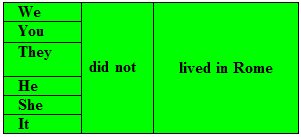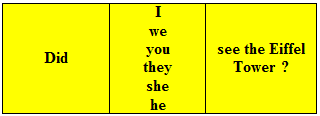
КАТЕГОРИИ:
Архитектура-(3434)Астрономия-(809)Биология-(7483)Биотехнологии-(1457)Военное дело-(14632)Высокие технологии-(1363)География-(913)Геология-(1438)Государство-(451)Демография-(1065)Дом-(47672)Журналистика и СМИ-(912)Изобретательство-(14524)Иностранные языки-(4268)Информатика-(17799)Искусство-(1338)История-(13644)Компьютеры-(11121)Косметика-(55)Кулинария-(373)Культура-(8427)Лингвистика-(374)Литература-(1642)Маркетинг-(23702)Математика-(16968)Машиностроение-(1700)Медицина-(12668)Менеджмент-(24684)Механика-(15423)Науковедение-(506)Образование-(11852)Охрана труда-(3308)Педагогика-(5571)Полиграфия-(1312)Политика-(7869)Право-(5454)Приборостроение-(1369)Программирование-(2801)Производство-(97182)Промышленность-(8706)Психология-(18388)Религия-(3217)Связь-(10668)Сельское хозяйство-(299)Социология-(6455)Спорт-(42831)Строительство-(4793)Торговля-(5050)Транспорт-(2929)Туризм-(1568)Физика-(3942)Философия-(17015)Финансы-(26596)Химия-(22929)Экология-(12095)Экономика-(9961)Электроника-(8441)Электротехника-(4623)Энергетика-(12629)Юриспруденция-(1492)Ядерная техника-(1748)
Positive and Negative Question
|
|
|
|
Past Simple
1. If we are interested in when a present situation began rather than how long it has been going on for we use Past Simple.
e.g. When did you arrive in Paris?
2. We use Past Simple for situations that existed for a period of time, but not now.
e.g. The Pharaohs ruled Egypt for thousand of years.
3. When we want to indicate that something happened at a specific time in the past we use Past Simple.
e.g. She arrived at the Kennedy Airport at 2 o’clock in the morning.
Jane left a few minutes ago.
Note: We also use Past Simple to talk about how long something went on if the action or event is no longer going on.
e.g. I stayed in this hotel for 6 months.
Table 2. The Grammatical Forms of Past Simple


Ex. 16. Complete the sentences. Pay attention to irregular verbs. Use Appendices for help. Listen and check.
1. Modern Germans ______ (adopt) an American approach to business to put visitors at ease.
2. The collapse of the old Eastern Bloc ______ (lead) to a renaissance of Vienna, the Austrian capital.
3. In recent years Madrid ______ (become) every bit as fanatical about “Europe” as Barcelona.
4. The firm ______ (start) a four-times-a-day bus service in and out of Bratislava, which was bookable when passengers made reservation on flight AS 120.
5. During their first trip to Europe they ______ (visit) seven countries in 12 days, a total distance of 2,750 miles.
6. They ______ (spend) a fortune on crystal in Venice, a cuckoo clock in Geneva, leather bags in Florence and silver spoons from almost everywhere.
7. In most European countries Continental breakfast ______ (be) the normal custom, consisting of tea or coffee, rolls and butter, jam or marmalade.
Ex. 17. Find where the time expression and the tense go together.
| Past Simple | Present Perfect | |
| for | ||
| since | ||
| in 1960 | ||
| ago | ||
| at 18.00 | ||
| just | ||
| before | ||
| yesterday | ||
| already | ||
| never |
Ex.18. Complete the sentences with the verbs in correct tense (Present Perfect or Past Simple). Listen and check.
1. Last year Britain _______ (have) 21 million overseas visitors up from 16 million just 5 years ago.
2. Italy _______ (open) the doors of its senate building to visitors offering guided tours of the 16th - century palace on the first Saturday of each month.
3. In 1988 Dublin _______ (celebrate) its 1000th birthday and _______ (be) designated European City of Culture in 1991.
4. The opening of the Austrian border _______ (lead) to a surge (= всплеск) in immigration and tourism from the east.
5. Business travel from west to east _______ (increase) according to an American Express survey of 120 international companies.
6. Estonia, the most westerner of the three Baltic States, _______ (be) quick to abstract foreign investments as to introduce its own currency, the Kroon, linked to the Deutschmark.
7. Even though Shakespeare never _______ (visit) Greece, he _______ (write) a few things that can help to understand the potential of this unusual country.
8. The city of Budapest _______ (be) originally two cities, Buda and Pest, devided by the river Danube.
Ex. 19. Fill in since or for. Listen and check.
I have wanted to visit France ever 1) ________ I entered college. I have been learning French history and culture 2) ________ the past two years, and have recently been looking into possibility of studying in France 3) ________ one month this summer. I have dreamed about strolling in the grounds of the Palace of Versalles 4) ________ so long. 5) ________ I began my studies, I have became aware of the significant contributions that French leaders writers, artists and scholars have made to the world. My professor has been traveling to France 6) ________over 20 years and he is still fascinated by its beaty and culture. 7) ________ his first trip in 1975 he has written many books about his travels there which are highly regarded all over the world.
Ex. 20. Read the dialogue and analyze the tenses.
Interviewer: Penny Goodman and her husband, Charles, with their son Harry, and his wife Olivia are on the last day of the Tornado Tour. They have visited seven countries in 12 days, a total distance of 2 750 miles. This is their first trip to Europe. Can I ask a few questions?
Penny: No problem.
Interviewer: Have you got to know the real Europe in 12 days?
P: Of course not. Seven countries – 2,750 miles! That’s why our tour’s called Tornado Tour!
I: Isn’t it ever annoying when you can’t get off the bus because you absolutely have to see Rome in 2 hours.
P: Well, I wouldn’t have liked to stay longer at a couple of places. But it was my first time I’m to Europe and so this was the right trip for me to get information of it, just to whet (= возбудить) my appetite.
I: Where would you like to go back to if you had a chance to spend just another five minutes in Europe?
P: Paris, Trocadero by night. Or Florence. To see Michelangelo’s David again. May be Germany – between Heidelberg and Bonn.
I: How was the food?
P: Swiss chocolate. Fantastic! I always get an allergy from American chocolate. But in Switzerland I could eat white chocolate for the first time in my life! Nestle’s Galak. That’s one name I’ll never forget.
I: What about cheese?
P: That’s right. In LA (= Los Angeles) you can spend hours trying to find cheese or an apple that hasn’t been sprayed with something or other.
I: Did you go to a McDonald’s here?
P: Once in London. But we have McDonald’s in the US too.
I: Did you pick up any souvenirs?
P: I picked up two outfits in Rome.
I: Really?
P: For a mere 600 dollars. We’ve all spent a fortune!
I: On what?
P: On crystal in Venice, a cuckoo clock in Geneva, leather bags in Florence. Have I forgot then anything? Oh, silver spoons from almost everywhere.
I: I think it’s good to go shopping even if you don’t buy anything. It’s good to know what everyone else has got just to compare. Has 12 days really been enough to see Europe?
P: My son and Olivia have – like most Americans – only two weeks vocation, so there was no choice.
(Headway Intermediate)
Ex. 21. Read the text, underline Past Simple and Present Perfect and explain their usage.
Much has changed in Berlin since 1989. Max Cuff visits the new and reminisces about the old.
If you intend looking for remains of its once-famous wall when you are in Berlin, you are in for a disappointment. It has gone. The cordon designed to keep fascism out and East German citizens in, which became the city's most famous landmark during the 30-odd years of its existence, is no more. It is now in millions of little pieces, most of them adorning people's mantlepieces around the world.
 The Wall came to symbolize East-West mistrust during the height of the Cold War. It was finally, officially, breached (=разбитый) for all time, on November 9, 1989. And in the months that followed, it gradually disappeared as young people, many of them members of Germany's growing army of unemployed, chipped off bits to sell by the roadside to tourists.
The Wall came to symbolize East-West mistrust during the height of the Cold War. It was finally, officially, breached (=разбитый) for all time, on November 9, 1989. And in the months that followed, it gradually disappeared as young people, many of them members of Germany's growing army of unemployed, chipped off bits to sell by the roadside to tourists.
Now that the Wall has gone, some of the myths that surrounded it are being exploded. The Stalinist-style government of the old East Germany saw it more as a symbol than as a real deterrent (= сдерживание). It knew that any citizen who really wanted to escape would find a way.
Now getting around Berlin is simple. A two-hour public transport ticket allows you to travel on the underground railway (U-Bahn), buses and the city railway (S-Bahn) for 120 minutes – easily sufficient to reach anywhere within the city limits. Taxis – usually comfortable Mercedes with diesel engines – are plentiful but costly.
German cuisine (= кухня) is not all sausages and sauerkraut: the city is full of small restaurants offering good, healthy food. The pubs – or kneipe as they are known – often do a very good dish-of-the-day at a surprisingly low price.
For those seeking culture, Berlin offers a surfeit (= слишком много) of good music, opera, museums and art collections. The Pergamon Museum is the best place in the world to view the art of ancient Egypt – apart from Egypt itself.
Modern Germans have adopted an American approach to business to put visitors at ease. There is a tendency to use first names when meeting foreigners, particularly Anglo-Saxons, but this does grate with some Germans. A good rule is always to refer to your contact as Mr or Mrs when you first meet. If invited out to lunch, dinner, or even a bar, the rules are the same as they are in France. He who invites, pays. Germans are not into the "rounds" favoured by the British. If you are invited to a German home, don't take a "bottle of something" or chocolates. If the host is a woman or a married man, the time-honoured practice is to take flowers and present them to the lady of the house, ensuring that the name of the florist is not given; something from your own garden or farm or, if you have no land of your own, unwrapped bought flowers.
Lastly, always be on time. This is not because Germans are super-efficient and like punctuality. If you are late you might eat into their leisure time and Germans – particularly Berliners – enjoy having a good time!
(World of Travel)
|
|
|
|
|
Дата добавления: 2015-03-31; Просмотров: 891; Нарушение авторских прав?; Мы поможем в написании вашей работы!